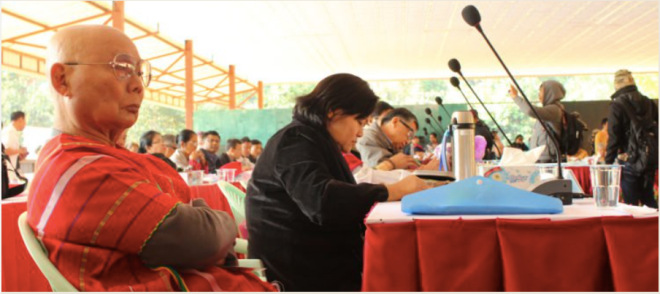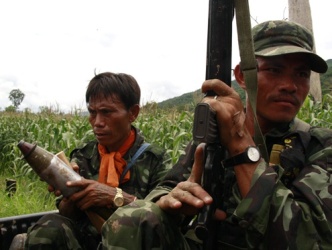 Not unsurprisingly, the Karen National Union (KNU) decided on 10 November to postpone its 16th Congress until around March next year. Also not unsurprisingly, critics of the current leadership were quick to call foul. They suggested that the decision was a nefarious attempt to maintain the current, and what they see as illegitimate, positions of Mutu Say Po and Kwe Htoo Win as leaders, whereas in actuality it just clearly made sense not to change negotiators during the current round of peace talks.
Not unsurprisingly, the Karen National Union (KNU) decided on 10 November to postpone its 16th Congress until around March next year. Also not unsurprisingly, critics of the current leadership were quick to call foul. They suggested that the decision was a nefarious attempt to maintain the current, and what they see as illegitimate, positions of Mutu Say Po and Kwe Htoo Win as leaders, whereas in actuality it just clearly made sense not to change negotiators during the current round of peace talks.
Much has been made about the decision which, according to The Irrawaddy, was taken because, ‘those in favour of postponing the congress were worried that electing new leaders—who do not have established relationships with the government and the Burma Army—would disrupt the peace process.’ For many, the decision is tantamount to treason, with at least one disgruntled individual asking the question ‘Anyone out there welling [sic] to chop Saw Mu Tu Say Poe and Kwe Htoo Win head?’
The KNU Congress is recognised as the KNU’s supreme legislative body and it is here that the Chairman, General Secretary, Joint Secretaries 1 and 2 and the Executive Committee (EC), the Central Standing Committees (CSC) and candidate members are elected. The seven KNU districts are responsible for electing the representatives, usually the District chairman and the Brigade commander, to attend the four yearly KNU congresses and two delegates are chosen to become members of the Central Committee. In addition, Central Committee members would provide the ministers for the Health, Education, Culture, Forestry, Mining and Finance.
Democracy loving critics of the KNU leadership seem to be blissfully, and perhaps intentionally, unaware of the fact that there were no congresses held from 1976, when Bo Mya came to power, until 1991.
In reality, under the leadership of Bo Mya, in the eighties and nineties, most political decisions were made by the 33 man Central Committee, or as often as not, the five-man committee of the president’s advisors (see Martin Smith, Burma: Insurgency and the Politics of Ethnicity). On many occasions, it would not be unusual for policy statements and changes to be made without any prior consultation at all. As Smith notes, although congresses were supposed to take place there were none until 1991 resulting in Bo Mya appointing the members himself. These were normally a senior KNLA officer and political governor.
Of course, the main problem stems from as yet unsubstantiated allegations that the votes in the last congress were rigged (see ‘Changing the Guard – The Karen National Union, the 15th Congress, and the Future’) as I noted in this paper,
The 15 Congress was held from November 26 to December 26 and was attended by 171 KNU representatives from all Brigade areas. To control the election process a 7 person election committee was formed and led by the chief election commissioner Pastor Robert Htwe, head of the Karan Relief Centre (KRC). The election committee was responsible for designing and implementing the election process and for counting votes and announcing appointments.
After deliberation and various discussions on how the movement could best proceed in relation to its policies and future role, the 171 representatives voted to elect members to the Central Committee. After votes were counted the names of those elected were announced and the ballots burnt by the election committee. The voting for the Executive Committee leadership was much closer than expected with neither Zipporah Sein nor General Mutu receiving the necessary 51%. As a result, a new vote was called for. David Thackerbaw asked that the new vote be a secret ballot, a request that was refused.
After the second vote, General Mutu won be a clear majority and after the result was announced the ballots were again burnt. Both Major Hla Ngwe Joint Secretary – 1, and David Thackerbaw Vice-president, lost their positions during the election process. David Thackerbaw, dismissive of the results, later that day called for a recount; however, with the ballots burnt after the original results had been announced and with no support for such a move from any other of the attendees the results were upheld.[1]
No evidence has thus far been put forward that suggests any malfeasance on the part of Robert Htwe or those counting the ballot, a number of whom were from the Karen Women’s Organisation and the Karen Youth Organisation. In the absence of evidence, what remains is an unsubstantiated rumour that has consistently been used to cast aspersions on people within the current leadership.
As one would expect in relation to the current situation regarding the postponement of the congress, such critics are unlikely to be subdued by any result that does not fit into their own myopic view of the KNU’s current leadership.
[1] Personal Conversation with KNU EC Member, 6 January 2013. The burning of the votes and other issues relating to the election have caused some controversy see http://dictatorwatch.org/
 Recent Conflict in Karen State
Recent Conflict in Karen State